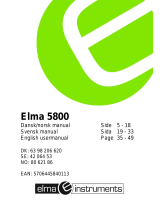
9
10
4). Keeping the probes on the test points when release the TEST key.
7. POWER TOOLS AND SMALL APPLIANCES
The upper right display shows the measured resistance reading
and the circuit now discharges through the meter, while the
main display reading shows the decreasing voltage, keep the
probe touched to test points until the circuit is completely
discharged and the main display shows “-----“.
This test would also apply to other similar equipment that has a line cord.
For double insulated power tools, one leads of megohmmeter to be
connected to the housing. The other leads would be connected to some
metal part of the tool (e.g. chuck, blade).
The upper right display holds the resistance reading until a new
test is started or a different function is selected.
Note: The switch of the device must be in the “ON” position and the main
power should be disconnected.
6-2 Using the LOCK Function to Measure Insulation Resistance
The LOCK function holds the test voltage on the probes. Use
LOCK function to make long duration measurements, don’t need to
push and hold the TEST key.
1). Press and hold the TEST key, then press the LOCK key to enter
LOCK mode. In this mode, a potentially dangerous voltage is
continuously applied to the probes.
In this mode, if the probes are disconnected from the circuit, the
meter cannot discharge any potentially dangerous capacitive
voltages left on the circuit.
MOTORS
AC-Disconnect the motor from the line by disconnecting the wires at the
motor terminals or by opening the main switch. If the main switch is
used and the motor also has a starter then the starter must be held, by
some means, in the “ON” position. In the latter case, the measured
resistance will include the resistance of the motor, wire and all other
components between the motor and the main switch. If a weakness is
indicated, the motor and other components should be checked
individually.
Ensure that the circuit is de-energized before connecting the test
probes.
2). Press LOCK or TEST key to disable the Lock function.
If the motor is disconnected at the motor terminals, connect one
megohmmeter lead to the grounded motor housing and the other lead to
one of the motor leads.
Disconnect the motor from the line. To test the brush rigging, field coils
and armature connect one megohmmeter lead to the grounded motor
housing and the other lead to the brush on the commutator.
If the resistance measurement indicates a weakness, raise the brushes
off the commutator and separately test the armature, field coils and
brush rigging by connecting one megohmmeter lead to each of them










